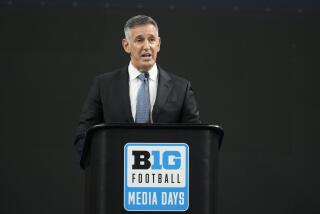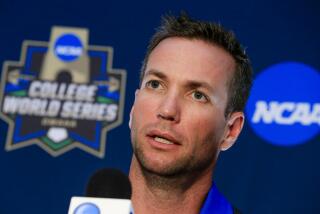Pond Officials Get Glimpse of NCAA Future in San Jose
- Share via
SAN JOSE — The NCAA West Regional ends here today, but this closing also signals an important start.
Anaheim is up next in the West Regional rotation and there’s plenty of work yet to be done. So officials involved with the Pond’s big event have been here all week, trying to figure out exactly how this whole thing works.
They said they’ve learned a lot along the way, and they can’t wait to get started on their own show. That’s good, because the clock is ticking and the NCAA doesn’t take kindly to tardiness or mistakes.
“We’re trying to find out what works and what doesn’t work,” said Brad Mayne, general manager of the Pond. “To be able to see what San Jose has done has been invaluable.
“This will help us avoid some of those little pitfalls that you know you will have to deal with.”
The Pond and Big West Conference will co-host the West Regional in 1998--the Pond’s first NCAA tournament involvement--and in 2001. The NCAA encourages upcoming hosts to observe the previous season’s site in action.
Mayne and Rob Halvaks, Big West associate commissioner, headed north to check out their future. The biggest lesson they learned? The key is planning, planning and more planning.
“We’ve had a real good opportunity to actually see the process at work and it definitely takes a lot of work,” Halvaks said. “We wanted to come out here and see a lot of things, and we saw even more than we expected.”
Staffing needs and arena preparation were among the primary issues for which Mayne and Halvaks sought options. Although the NCAA provides a detailed manual on regional planning, the nuances of each site force officials to make adjustments on the fly.
Officials at the San Jose Arena, this season’s West Regional site, have been extremely helpful to the Pond regional scout crew. The Pond and Big West should be on solid footing for next season, a San Jose official said.
“We’ve been fielding a lot of questions from them,” West Regional spokesman Lawrence Fan said. “We’ve exchanged thoughts, ideas and questions, so I think this has been very helpful for them.”
Halvaks said he now has a better understanding of the amount of volunteers needed to make next season’s regional run smoothly.
“By seeing what San Jose did, we can set some solid projections on the numbers we’ll need,” Halvaks said. “This experience will also help us figure out the types of roles we need to fill.”
CBS keeps regional managers hopping with its production needs. Halvaks and Mayne also got some insight on how to best accommodate the TV people.
“There will be some basic adjustments made for the physical differences of the San Jose Arena and the Pond,” Mayne said. “But what we now have is a good working model of how to handle all the communication needs.”
An unexpected benefit of the trip was what Mayne and Halvaks learned about community support for regionals. The arena and hotels aren’t the only things that need coordination.
“We need to make sure that the shuttles are running on time to the hotels, that restaurants are open, that there are no problems with the hotels, the whole mix like that,” Halvaks said. “San Jose did a great job handling all of those things. We need to make sure we address the same issues with the Anaheim marketplace.”
Less than a year remains for the Pond and Big West to work out the kinks. That’s a lot less time than you might think, and nobody knows better than Mayne and Halvaks.
“San Jose did a great job and we want to build on that,” Mayne said. “We’ve already gotten started.”
More to Read
Go beyond the scoreboard
Get the latest on L.A.'s teams in the daily Sports Report newsletter.
You may occasionally receive promotional content from the Los Angeles Times.










